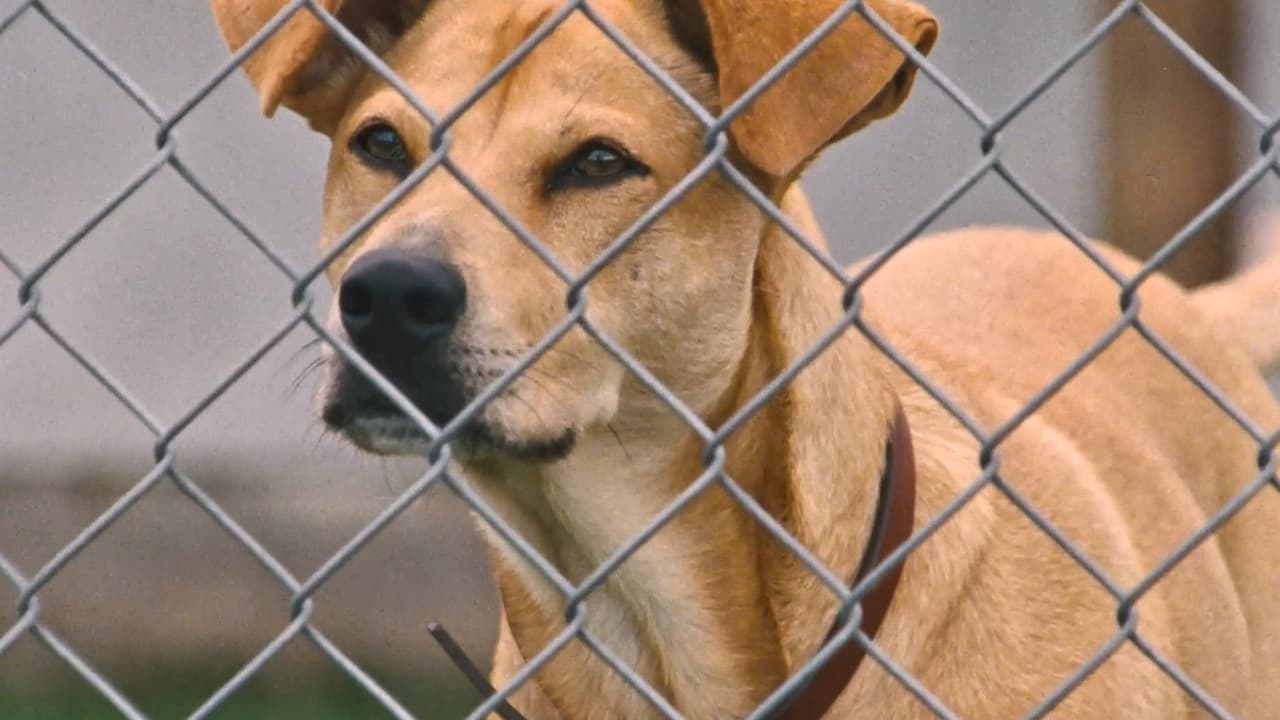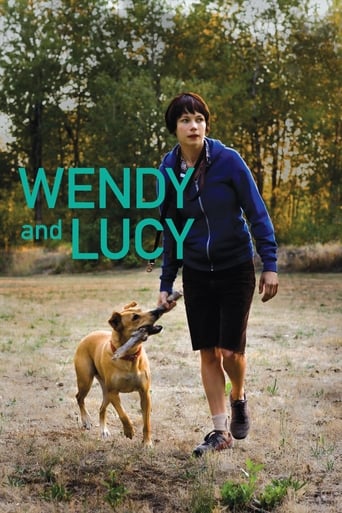

You can see Wendy is bummed about life from the very beginning. Only a young adult, yet her walk is lethargic, eyes dead pan, face managing to both carry the weight of the world and move not a muscle. It's all she can do to keep it together while road tripping to Alaska in search of employment, but whatever vestige of control she has gets wrestled from her in a small town somewhere in pretty Oregon. Her car breaks down, she is arrested for shoplifting from the supermarket, during which time Lucy, her dog and only companion, goes missing. As she searches for Lucy, and tries to get the issues with her car sorted, Wendy's bleakness becomes the films bleakness, and we can hardly crack a smile despite some of the well captured idiosyncrasies of the characters she meets - a saint of a carpark security guard, with naught to do all day but stand around with his hands in his pockets, and a mechanic who places bets over the phone. If the film has one grave mistake it is to paint her irrational character in a sympathetic light, whilst painting the rational world around her as oppressive. Should we really sympathise with a shoplifter? Only if she is the victim, and shoplifting her only way out. But although she's in a difficult situation, Wendy is not nearly as victimised as the film attempts to portray her. She had money to pay for those goods, but made the decision not to, and it was her choice to travel hundreds of miles in a bunk car with a limited budget to begin with. Furthermore, we are not even given a backstory to understand how she came to such a bleak outlook, making it even more difficult to sympathise. Because we are human we feel for her sadness, but this alone does not a great film make. If the film has a second grave flaw, its that it is very slow, and so unapologetically dour, that it becomes tedious to sit through. It's a shame it doesn't have a much shorter edit, for the 16mm well lends the subject matter an inviting, personal feel.
... View MoreI liked this movie for its minimalism and its characters. Its protagonist is a weak individual whose main source of emotional support is her dog. In the end she can't even protect the dog and leaves her with a better provider, thus leaving herself completely alone. This story is a kind of minor tragedy that emphasizes the downside of American individualism and what happens to a person when his or her support group collapses and they have nothing left. At the start of the picture Wendy's car breaks down and she meets the security guard that helps her push her car off of the parking lot. The guard represents the sole example of human kindness that Wendy experiences the movie. Wendy foolishly attempts to shop lift food for her dog and gets caught and sent to jail. She has to pay a large fine and her dog is gone when she is released. The rest of the movie is Wendy's search for her dog which she finds at the end. Her decision to leave her dog with the new owner is a personal tragedy for her because, as we see in the final scene, she is totally alone in a freight car facing a dangerous and uncertain future.I see this movie in political terms. Republicans that despise the poor and weak will hate this movie for the sympathy that it shows for Wendy. Most American movies emphasize strength or defiance in the face of injustice or adversity. The most that Wendy can do is cry in despair and cling to an improbable hope for the future. This is the core of the film's realism. Without a support group we are all like Wendy. The American myth of the rugged individual is a stupid lie.
... View MoreDear Kelly Reichardt,escapism is obviously not your forte. Wendy and Lucy, one of the surprisingly few films to come out of America about life during a recession, is a road movie lacking in any sort of excitement or shots of beautiful American highways. A broke woman (played by an almost anorexic Michelle Williams) is driving across the US to report for a job in another state. But her car breaks down and she loses her dog. Her unromantic struggle where there is no adventure but only an endless, tiring and boring fight against her own poverty and the cold-blooded systems in place forms much of the movie.There are hardly any people in the American small towns through which the woman drives. It is almost like a dead urban wasteland. The only queues are for people lining up to sell old bottles. That's how badly things have deteriorated. It is no wonder that crooked politicians want to bring in more people into Western nations in the form of immigrants.The film is completely devoid of any sort of narrative punctuation or shock value. So you would not find the woman seducing horny men or her indulging in hard drinking. Survival in the urban wasteland is boring. The bleak and rather dour visuals paint a picture of small town American suburbs as if a plague has descended upon them. Michelle Williams as the emotionally jaded and physically fragile young American woman fits the visuals and surroundings perfectly. Her relentless search for her dog in the face of ignorance and cruelty from the people around her tells a lot about the state of human relations in the modern world. Anyway, I like films with more escapism. I would have made this film differently. There isn't much wrong with your film I guess. But I am just a very subjective guy. I will check out more films by you, Kelly.Best Regards, Pimpin.(5.5/10)
... View MoreSimplicity, when employed wisely, can serve as an enhancement. Subtlety almost always does. Of all the films I've seen in recent months, including high budget productions and much artistry, this quiet drama with few words, a simple plot and more suggestions than out-spun explanations about the protagonist's background has hypnotised me the most. Everything about this film is just right, every word, however mundane. The carrier is without doubt the lead actress: she's done her job if you feel the person on screen actually has to exist, and you do. Williams is perfectly cast; it's perfect if one is convinced that no other should have played a part. Beside this Wendy's plight might feel awfully familiar to some. Feel, as it is the making that successfully makes the bleak experience of being stranded in a town with a possibly even bleaker past and no real idea about the future tangible. The film is to a large degree an in-between the lines reader. And nothing is added that isn't necessary. Very well done, by anyone involved.
... View More